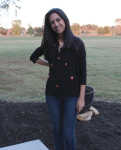Finding her Christian self in the midst of Muslims

This is the second in a series.
A small group of friends gathered recently at the home of Bill and Sue Fischer of Fort Scott to learn about the work their former pastor, Rev. Mansour Khajehpour, is now doing with SAT-7, which provides Christian television programs to thousands of Arab, Turkish and Persians in the Middle East.
Khajehpour served at the Fort Scott First Presbyterian Church from August 2010 to January 2012.
Khajehpour was not in the U.S., but two of his colleagues, Nikoo Ordodary, SAT-7 PARS deputy executive director, and Rex Rogers, SAT-7 USA president, painted a picture of what the programming is doing.
Ordodary also shared her journey to becoming a Christian.
"I was a believer when I was 16," Ordodary said.
She grew up in Tehran, Iran.
"I was a Muslim girl, like everybody else," she said. "Never went to the mosque ritually, but I didn't believe anything different than anybody else who went to school with me, our neighbors and family members."
Her mother was from southern Iran, and her mother's family were liberals -- not "fanatics." Her father was from the center of Iran where there were a larger number of practicing Muslims "and they were a little bit more fanatic," Ordodary said.
When Ordodary visited her paternal grandparents, she said she had to be "a good Muslim girl and pretend that I do everything right." But when she visited her maternal grandmother, she said "I could be whoever I wanted."
"In a way I was living a dual life and I didn't know who I was," she said. "I didn't know who God wanted me to be and I didn't really know him at all."
Ordodary said even though she was young, she was "eager to find out about God."
"God was not a big issue at my house. Mom and Dad did not speak about him much but I really wanted to know more," she said.
She said at school, students were asked to pray in Arabic, not Farsi, the language of Persians.
"That was very strange to me that I have to speak to God in a language I don't understand," Ordodary said. "And it didn't really make any sense to me because my Arabic accent is horrible and deep down I knew God might be laughing at me."
She said she tried, and did memorize many of the prayers.
At age 9, Ordodary reached the age where she could "officially communicate with God." This is the age when young girls had to begin to abide by the rules, such as covering all of their hair. A ceremony is held at the mosque to mark this new beginning for the young girls, she said.
"We all got ready, had our costumes embroidered for the day, my mother prepared (the costume) for me," Ordodary said. "A Muslim was talking to us, telling us the kind of lives we were supposed to lead as Muslim women. I didn't feel worthy. I felt like my life was so hopeless, the way I was being spoken to, the life I thought (was ahead) for me -- the life 10, 20, 30 years from then. I thought life was going to be so uneventful and I was not going to have a chance to get to know God or make a difference for him. I felt like my life was planned out for me and I had no say in it."
That day, as she prayed, she looked at her best friends sitting next to her.
"And I prayed, 'Don't let my life be like this, God. Show yourself to me and let me make a difference. I don't want to live like this. I want an eventful life,'" she said. "And look at me. I never thought I would be in the Midwest talking about it."
When Ordodary was 12, her parents moved the family Cyprus, but it was two weeks before her mother told Ordodary and her brother they were not going back to Iran. Ordodary said they were shocked and when they asked why, they were told their father was going to find a job in Cyprus and it was going to be better for them. They were also told to not worry about leaving their friends behind because they were going to join a Farsi-speaking community where there were good people and they would make friends.
"What she meant was the church," Ordodary said.
Each Sunday, the English-speaking community would gather in the morning and the Farsi-speaking community gathered in the afternoon. Ordodary said at first she was skeptical, but for the first time, she heard hymns sung in Farsi.
